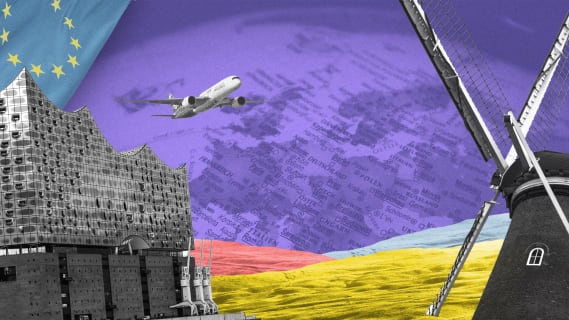What is the golden mean for self-development? Meet some Boldare ideas
How does Boldare support and enhance employee self-development? Why do we believe that the team and work culture make a real difference in your growth? If you’re curious for answers, read this article.

Table of contents
A knowledge-sharing community and working in a flexible company seem crucial for many employees. Not surprisingly, these elements are seen as the secret sauce to developing and learning. But how exactly can an employer and colleagues support your personal development at work? Meet the elements that allow Boldare people to grow every day.
Clear goals
Clear and lucid development goals are the first step to working effectively on your skills. At Boldare, we make sure that everyone regularly defines specific goals that they want to achieve soon. We set goals with team leaders and share them transparently with all team members so that the team can support us in achieving success.
Well-defined development goals help Boldare people reach higher levels of seniority and, as a result, higher salaries. Every year, each team goes through a “Teams Salary” process to determine the seniority of its members. The process involves all team members, who evaluate each other’s skills through substantive and transparent feedback.
Apart from the team’s own evaluation process, you can always go through a technical verification and check your skills as well. For those who grow at a faster pace, there is an option to apply for an individual “Fast Growth” process. It works on similar principles to the team process but allows exceptionally talented people to reach higher seniority and salary faster.
Individual career path
We believe that an individual career path is fundamental. It allows you to achieve professional fulfillment and also, importantly, serves as motivation. At Boldare, we bet on self-organization, independence, and decision-making. Therefore, it is entirely up to you to decide in which direction you want to develop.
You independently direct both your onboarding and development path. You can direct it in light of your role (e.g. Product Strategist or Scrum Master) and considering the area in which you want to improve your skills (e.g. leadership or mentoring).
A hallmark of Boldare is building products in dedicated phases, or what is known as Full Cycle Product Development. Teams, depending on which phase of product building they participate in, are focused on different areas. This can include a drive for strong technological and specialization development, as well as a focus on developing the business aspects of working with diverse, international customers.
Boldare people have the opportunity to engage in a variety of activities – both at a team level and that of the entire organization. We adhere to a principle of transparency, so at any time you can join the meeting of another team and propose a solution in a specific area, after which you can truly commit to working on its implementation. We don’t limit people, so changing a product or even an entire career path is a natural occurrence for us every day. Long story short, we know Developers who became Scrum Masters and Content Specialists who learned to program. Believe us, anything is possible.
Chapters
Full Cycle Product Development (FCPD) requires the existence of specific teams. There are also chapters that support them, addressing specific needs, and serving as innovation hubs. They gather knowledge and enable its efficient sharing and use. Boldare currently has two Chapters: Chapter Build and Chapter Measure & Learn.
Chapter Build develops the array of tools and techniques used to build products in the various phases of FCPD. In doing so, it supports the entire organization in its technology mission. Chapter members are Developers, Scrum Masters, Designers, DevOps, and others. They educate on how best to select materials and tools to build a specific product, share best practices, and seek improvements to technology processes. Chapter Build is a space to share knowledge and bounce ideas around, learning about different tools and how to use them effectively.
Chapter Measure & Learn, on the other hand, is focused on analytics, metrics, and user research. It’s a kind of research team that spreads the Measure & Learn approach throughout the organization, optimized for effective data measurement. Here you’ll find research, analytics, and consulting roles that educate product teams and customers about tools, processes, or frameworks to validate hypotheses more effectively. This chapter is an ideal place for innovative ideas and the development of research competencies. Both hubs have budgets for learning and tool purchases.
Learning opportunities
Nothing broadens horizons and encourages self-development more than reflecting on the thoughts and drawing on the know-how of respected experts in a given field. Team participation in knowledge-oriented events and conferences is one of our ways of improving the skills of Boldare people. That’s why each team in the organization has a dedicated development budget, which it manages independently. Funds often go to trips to conferences and workshops, as well as to individual training for specialists in various fields.
In addition to attending external events and improving skills through a variety of training courses, we also steward internal initiatives. At Boldare, there are formulaic hackathons, tailored to specialist areas. These are Designathons and Scrumathons, which allow us to solve specific problems together and build effective solutions for the future. We also organize ‘lessons learned’ meetings, which not only help to learn from mistakes, but also increase transparency and a drive for knowledge-sharing in the organization.
Bench Team
Although commonly the bench does not have a very good reputation, Boldare people know very well that with us on the bench you can develop (and these are not just empty words!). People on the bench in the organization do not sit idle. Every day, they are gaining valuable product experience, no less than when working with customers. People on the bench mainly carry out internal product work and charitable pro bono product development for special external clients, such as NGOs.
There is a strong emphasis on learning new things (e.g., recently we have been very inspired by no-code solutions). The Bench Team has its own development budget, which is used for the employee personal development. We allocate dedicated time to it – 20% capacity for each member. This solution supports responsible planning and thoughtful development activities. Importantly, and at the same time interestingly, anybody on the bench at Boldare can at any time go to a commercial project and act as a shadow or mentor.
Work culture
Working openly and truly Agile supports knowledge sharing. The Boldare community gives each other mutual and ad hoc support daily during meetings, or communications via Slack. For us, even simple communication is also a place for technology news, daily inspiration, and idea sharing. What else do we do to learn from each other?
- Our Designers have introduced the double-check rule, which means bouncing thoughts off of other creative heads regularly.
- Our Scrum Masters often practice shadowing, that is, attending meetings of their peers and learning best practices from them. It is also common for Scrum Masters to lead each other’s scrum events and exchange mutual feedback.
- Scrum teams at Boldare are interdisciplinary and diverse in terms of seniority – so that people can learn from each other.
- Juniors each have their buddy with whom they plan their development. The role of buddies is also a great opportunity for mediors and seniors, who can not only support the younger trainees but also develop themselves in new, mentoring roles.
Boldareship Academy
Boldareship Academy is our next idea for self development at work. It’s an internal program that gives Boldare leaders the tools to build environments that are conducive to creating things that do not yet exist, in both our company and our clients’ companies. Is there still room for leadership in an organization without managers? — some may ask. The answer is: yes! Leadership becomes a topic for everyone, not just a handful of managers. More levels of leadership emerge. If people are to make decisions on their own, they need visible data, familiarity with budgeting mechanisms, and the ability to give feedback directly.
At the Academy, Boldare people can learn things that are useful in everyday work (team facilitation, goal setting, group dynamics, decision-making processes in distributed groups, etc.) as well as how to create a vision, strategy, or tactics. A lot of space is also devoted to personal development and the ability to cope with stress. Various people attend it: Developers, Designers, Scrum Masters, Area leaders, Sales, or Customer Success Specialists.
Curious about new opportunities at Boldare? Check out our career site and find your dream job now, or join our talent pool!
Share this article:






